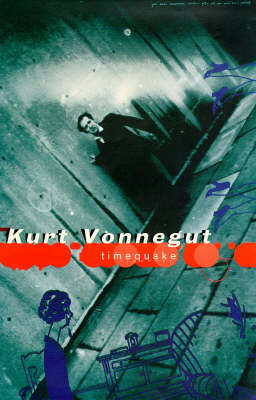
clementine
Written on Jun 3, 2019
Timequake is a fitting end to this journey, as it was Vonnegut's last "novel" (though that term should certainly be used loosely), which he knew when writing it. It's more a retrospective on his life and career than a novel, though he does weave in some fictional elements which are treated in his trademark absurd, surreal way.
Back in 2012, I wrote an essay about the treatment of time in Slaughterhouse-Five. More excellent symmetry, then, that Timequake is, unsurprisingly, centrally concerned with the idea of time and its flexibility. Vonnegut blends past and present, fictional and real, in mind-bending ways. The Timequake in question occured in 2001, but the book was written in 1996 - so he is speaking in the past tense of something which happened in a future that he had not yet experienced. (A funny/sad moment: he assumes he will be alive in 2010, which was not the case.) The "novel" is framed as the second version of a novel with the same premise, but Vonnegut mostly writes about his own life, while sprinkling in some ideas and passages from the original novel, which he scrapped. Yet the characters in this novel are treated as real people who he knows in the year 2001 (which, again, at the time of the book's publication, had not yet occurred).
Amidst all these contradictions lie some interesting ideas. Perhaps this is a warning that history is doomed to repeat itself because humans are too stupid and apathetic to make meaningful changes. On a smaller scale, though, it's also about how we each get stuck in our own pasts, reliving painful and wonderful moments again and again, as Vonnegut certainly does throughout the book. (His lingering pain over his sister's premature death is apparent - he wrote fairly extensively about it in the introduction to Slapstick, as well.) Vonnegut's guiding thesis through most of his novels is the importance of kindness. Though he's known for his black humour and cynicism, there's a lot of hope in his worldview, which is certainly present in Timequake. Hell, he even refers to himself as "sappy"! Fittingly, it's moving, it's sad, and it's really funny. Pitch-perfect Vonnegut.
I think this book is one for established Vonnegut fans; it's too strange and meandering to serve as a good entrypoint. Because it's not a novel in the sense of his other books, this makes sense to me almost as a nice way of wrapping up his body of work, alluding to many of his recurring themes and philosophies and giving us one more absurd Vonnegut situation to ponder. Other issues are that his outdated social views become pretty apparent here in the way he talks about women and racial minorities. I mean, the man was a socialist, so we're not talking horrendous politics across the board, just the writing and politics of a man who was born in 1922. Not a dealbreaker, and I still love his mind and have cherished the past seven years I have spent reading his novels, but, you know. Not the most charming aspect of his work!

